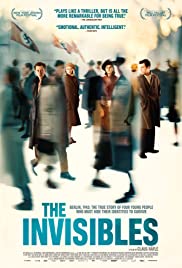
THE INVISIBLES/ DIE UNSICHTBAREN
Germany, 2017, 110 minutes, Colour.
Max Mauff, Alice Dwyer, Ruby O.Fee, Aaron Altaras, Victoria Shultz, Florian Lukas, Andreas Schmidt.
Directed by Claude Rafle.
A docudrama about Jews living in Berlin in the early 1940s.
The focus initially is on Jews leaving Berlin, getting out of Germany, the anticipation of arrests, the anticipation of the concentration camps and the Holocaust. However, the film shows a number of young people who decide to remain in Germany, sometimes incognito, sometimes getting jobs, protected by sympathetic Berliners.
On the one hand, the film is a documentary. On the other, a drama. The drama of the young people in Berlin is played by actors, showing the background of their families, decisions to remain, the struggle for jobs, poverty, the background of daily life in the city during the war.
The documentary is actually a series of talking heads, interviews with the characters who are portrayed in the drama, 70 years after their experience in Berlin, the memories of their life, situations, struggles, and the consequences of the end of the war and their building their lives in succeeding decades.
A memorial of Jewish struggles in Germany and Berlin as well as a film of hope about survival and re-building lives.
1. The impact of the film? Another perspective on World War II, Nazis, the Jews, persecution, survival in Berlin?
2. The talking heads, the documentary perspective, the interviews with the central characters in their old age? Their liveliness, memories, interpretations?
3. The dramatising of the lives of these characters? Moving from the drama to the interviews?
4. The declarations by Goebbels, ridding Berlin of Jews, the various steps, deportations, the gradual revelations about the concentration camps, Goebbels’ declaration that there were no Jews in Berlin? The Russian soldiers believing this?
5. Berlin, 1941, Jews moving from Berlin? Those deciding to stay? Those allowed to stay for work? Young people, their jobs, their identities, secrecy? The bonding of various groups?
6. Ciomo, young, his parents and family, going to register, the farewell to the family, his job in the guns’ factory, the various attempts to find accommodation, being sheltered? His job in forging the documents, his skills, the officer in charge, increasing the jobs, yet his having to move? His documents in the fire for the heating? His eventually being trusted?
7. Eugene Friede, his age, his work, the family sheltering him, disguised with the uniform?
8. The women, the young woman working in the factory, the rash on her hands from the silk parachutes, the doctor and helping her? Her wandering the city, dyeing her hair blonde, going to the movies, the encounters with the men, the recruit and walking with her, asking her to be friendly with his mother? Her moving in, their bonding?
9. The two young women, their friendship, hungry, getting the jobs cleaning, the serving in the family, their being welcomed? The effect of the bombardment?
10. Stella, blackmailed by the Gestapo, her informing on her friends, the encounter with Ciomo, memories of past days, his inviting her to see his house, her saying it was a bad idea? Redemptive for her, survival for him?
11. The years passing, the range of difficulties, gradual news about the concentration camps?
12. Heinz Winkler, his sympathies, family, helping to provide accommodation, the Jewish group, the printer, writing pamphlets, distributing them, arrests?
13. April 1945, the Jews sheltering, going out for water, the Russian soldiers arriving, the soldier’s suspicion about Jews, making the young men recite the Shema Israel, his being Jewish himself?
14. The aftermath of the war, these young people discovering what had happened during the war, the Holocaust? Life after the war, migrating, returning, families, their heritage?